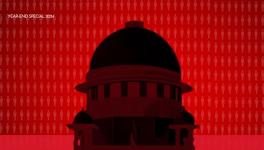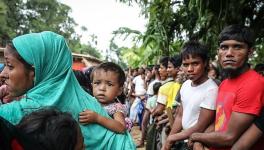Justice Delayed but not Denied: Convicting 31 Rioters in Gujarat
Internal security is all about Justice. Justice in the distribution of food, Justice in the alleviation of poverty, Justice in the observation of Rights, Justice in the implementation of law are just some of the aspects that make citizens secure, and nations vibrant and healthy.Governance to be effective has to be Just, without prejudice and discrimination.
After the judgment of the special court convicting 31 persons, the families of the 33 persons who were burnt alive in the Sardarpura massacre in Gujarat in 2002 by a frenzied mob must be feeling a little more confident that Justice is not dead in India. And that even though the political system is compromised, there are individuals and civil society that is prepared to stand by them and knock at all available doors for Justice. The tenacity of many of those working in Gujarat and outside in pursuing the cases of murder and rape is commendable and admirable, and as activist Teesta Setalvad has said, the verdict has restored the faith of people in the judicial system. Thirty one have been given life imprisonment, although 42 have been acquitted. Even so the number convicted is unprecedented.
Several cases are to come up before the courts, with the Supreme Court having monitored the process in part. It remains to be seen whether evidence of political conspiracy at the highest level in Gujarat will be raised by the Special Investigation Team before the courts at all. But the fact remains that a good beginning has been made, and optimism has returned to some extent amongst those who have been fighting not just the cases, but powerful political leaders in their nearly decade long struggle for Justice.
Many battles would have been won, and major problems and issues averted, if the political class had been sensitive to the need for dispensing Justice over the years. The alienation amongst Sikhs reached new levels after the 1984 massacre in Delhi where Congress leaders led the mobs to hunt out and kill over 2500 Sikhs all across the national capital. The subsequent years saw a running battle between the people and the Congress party that kept trying to reinstate the tainted leaders, even as it denied Justice to the victims. Similarly, Gujarat was a blow to secularism across India, with Muslims still not having reconciled to the open murder and rape of thousands in Gujarat by motivated mobs under BJP chief minister Narendra Modi. The state law and order forces disappeared from view and allowed the carnage to continue unabated.
In fact the history of Independent India has been dotted with communal violence ---Meerut, Malliana, Kanpur, Aligarh, Bhagalpur, Hubli, Bhopal----with the recommendations of enquiry committees/commissions remaining buried in the corridors of power. The reluctance of the political parties in power to dispense Justice in such cases is amazing, more so as the wounds continue to fester in the absence of Justice. Hundreds of thousands of families affected by communal and caste violence have given up hope altogether, carrying anger and insecurity as part of their baggage.
Some are able to manage, but for many the injustice generates deep helplessness that is the root cause of many of the problems affecting states and communities. Significantly a direct Hindu-Muslim clash does not generate the same trauma if the state administration is perceived to be taking just and effective action. The problems really arise when the state joins the perpetrators of violence, either during the attack by directing its police machinery to stay away, or after by deliberately blocking the wheels of justice through deliberately shoddy investigation. This generates deep insecurity that ghettoizes castes and communities, and creates fissures that are not easily bridged.
The special court verdict thus, while welcome is clearly not enough. Gujarat Congress president Arjun Modvadiya has said that the “crocodiles” had been acquitted and clearly not investigated. If he truly believes this, then the Congress should play a major role in exposing the facts and ensuring all comprehensive Justice. There has been too much of rhetoric and little action, with the real work of approaching the courts and fighting individual cases being left to civil society, many of whom are in the state government’s direct firing line.
The Sardapura investigation was one of the nine cases handed over by the Supreme Court to a Special Investigation Team, and this is the first case in which a verdict has been given.
The larger issue remains Narendra Modi’s involvement in the 2002 violence. The SIT reportedly has found no involvement of Modi’s complicity in the violence, (there is no official word on this, only media leaks) although the chief minister has been named in the petition filed by Mrs Zakia Jafri, widow of the slain Congress leader Ahsan Jafri. A report has also been filed on this by senior advocate Raju Ramachandran authorized to tour Gujarat as an amicus curiae (friend of the court). However, the court has left it to the SIT to decide whether or not to take Ramachandran’s report on board. Again leaks suggest that this report admits to grounds for further inquiry into Narendra Modi’s role during the violence. But again there is no official confirmation.
It must be remembered that senior police officer Sanjiv Bhat, who is is facing the wrath of the state administration for some frank talking, had filed an affidavit raising some serious questions about the probe beingcarried out by the SIT. Privy to considerable information as a senior police officer, he has deposed before various Commissions of Inquiry about the role of Narendra Modi in the violence. He was arrested by the government and while he has just got bail, his family remains fearful for his life. Important witnesses have died mysterious deaths in Gujarat, with no arrests of even possible assailants. Courageous officers lie Bhat need to be protected, and perhaps the UPA government at the centre that does not hesitate to impose its writ on states in financial matters, should ensure the security of Bhat and all those seeking justice in Gujarat.
Fortunately, unlike 1984 where the Sikhs were left to fight their own cases, in 2002 the Muslims were not left alone totally. Perhaps the awareness is greater now, and at least the response of civil society has not allowed the crime to be virtually washed, or for that matter, wished away. There is resistance that has managed to tangle the perpetrators in legal knots, and even made Narendra Modi accountable. If the courts and the people succeed in ensuring Justice it will go a long way in preventing such massacres in thefuture, and strengthen the foundation of secularism and democracy in India.
Get the latest reports & analysis with people's perspective on Protests, movements & deep analytical videos, discussions of the current affairs in your Telegram app. Subscribe to NewsClick's Telegram channel & get Real-Time updates on stories, as they get published on our website.
























